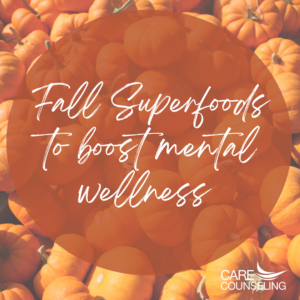Fall Superfoods to Boost Mental Wellness
 As the leaves change color and the air turns crisp, fall ushers in a new season of flavors and nourishing foods that can have a significant impact on our mental wellness. Just as the earth prepares for a period of rest and renewal, we too can support our emotional well-being by embracing fall superfoods that are rich in nutrients known to enhance mood, energy, and overall mental health. From vibrant root vegetables to antioxidant-packed fruits, these seasonal delights offer a powerful way to nourish both body and mind.
As the leaves change color and the air turns crisp, fall ushers in a new season of flavors and nourishing foods that can have a significant impact on our mental wellness. Just as the earth prepares for a period of rest and renewal, we too can support our emotional well-being by embracing fall superfoods that are rich in nutrients known to enhance mood, energy, and overall mental health. From vibrant root vegetables to antioxidant-packed fruits, these seasonal delights offer a powerful way to nourish both body and mind.
The Gut-Brain Connection
It’s becoming increasingly clear that there’s a strong link between the gut and the brain—often referred to as the “gut-brain connection.” The foods we eat play a role not only in our physical health but also in our mental state. Certain nutrients found in fall superfoods can have a positive impact on neurotransmitter function, inflammation levels, and hormone regulation—all of which influence our mood, cognition, and emotional balance.
Fall Superfoods to Boost Mental Wellness
- Pumpkin: This iconic fall ingredient isn’t just for carving. Pumpkin is rich in vitamins and minerals, including vitamin A, which supports vision and immune health. It also contains fiber that supports digestive health and helps stabilize blood sugar levels, promoting steady energy levels and mood.
- Sweet Potatoes: Packed with vitamins A and C, sweet potatoes are not only delicious but also beneficial for mental wellness. These nutrients are antioxidants that protect brain cells from oxidative stress and inflammation, promoting cognitive function and reducing the risk of mood disorders.
- Apples: The saying “an apple a day keeps the doctor away” holds true for mental health as well. Apples are a good source of dietary fiber and vitamin C, which support immune health. The fiber in apples also helps stabilize blood sugar levels, preventing energy crashes that can negatively impact mood.
- Brussels Sprouts: These miniature cabbage-like vegetables are a fall favorite for good reason. Brussels sprouts are rich in folate and vitamin K, both of which are important for brain health. Folate supports the production of neurotransmitters like serotonin and dopamine, which play a crucial role in mood regulation.
- Cranberries: Known for their high antioxidant content, cranberries can help reduce inflammation and oxidative stress, which are linked to mood disorders. They’re also a good source of vitamin C and fiber, supporting both physical and mental well-being.
- Walnuts: These nutrient-packed nuts are an excellent source of omega-3 fatty acids, which are known for their anti-inflammatory properties. Omega-3s are essential for brain health and have been linked to improved mood and cognitive function.
- Pomegranates: Bursting with antioxidants called polyphenols, pomegranates offer a powerful way to combat oxidative stress and inflammation. These antioxidants have been associated with improved mood and cognitive function.
- Beets: Beets are not only visually stunning but also rich in nutrients that benefit mental health. They contain betaine, a compound that supports the production of neurotransmitters and helps reduce depression and anxiety symptoms.
Incorporating Fall Superfoods into Your Diet
Integrating fall superfoods into your diet doesn’t have to be complicated. Here are some easy ways to enjoy these nourishing ingredients:
– Roasted Veggies: Roast sweet potatoes, Brussels sprouts, and beets with a drizzle of olive oil and your favorite herbs for a flavorful and nutrient-packed side dish.
– Smoothies: Add pumpkin puree, apples, and walnuts to your morning smoothie for a dose of fall flavors and mood-boosting nutrients.
– Trail Mix: Create a trail mix using dried cranberries and walnuts for a convenient and nutritious snack that supports brain health.
– Pomegranate Seeds: Sprinkle pomegranate seeds over salads, yogurt, or oatmeal for a burst of antioxidants and color.
-Baked Goods: Incorporate pumpkin or apples into your baking recipes, such as muffins, bread, or oatmeal cookies, for a comforting treat.
Mindful Eating for Mental Wellness
Beyond the nutrients they provide, fall superfoods also offer an opportunity for mindful eating—a practice that encourages you to savor each bite, appreciate the flavors and connect with your body’s signals of hunger and fullness. By practicing mindful eating, you can cultivate a healthier relationship with food, reduce stress-related overeating, and promote a sense of satisfaction and contentment.
As the seasons change, so do our nutritional needs and the foods that are readily available. Embracing fall superfoods is a delicious and impactful way to support your mental wellness. By nourishing your body with nutrient-rich ingredients, you’re also nurturing your brain and promoting emotional balance. As you savor the flavors of the season, remember that the choices you make in the kitchen have the power to contribute to your overall sense of well-being—a powerful reminder of the interconnectedness of body, mind, and the changing world around us.



























